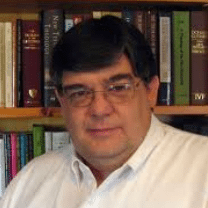
The Future: How Does God Know It?
One aspect of God’s omniscience is his knowledge of the future. Open Theists have denied this, of course, but the question is not really a difficult one. Over and again in Scripture God is presented as knowing what will happen. Not just selectively but exhaustively God knows all that will be. Indeed, in Isaiah 46:8-10 God presents his knowledge of the future as proof of his deity: “I am God, and there is no other; I am God, and there is none like me, declaring the end from the beginning and from ancient times things not yet done, saying, ‘My counsel shall stand, and I will accomplish all my purpose.’”
For this reason I am very willing to describe the “openness” theology as virtual atheism. It has defined God in a way that strips him of that which according to God himself is essential to his deity. But in all this discussion the question at some point must be asked, How does God know the future? Or, more to the point, What is the ground of God’s knowledge? How does God know what he knows? Isaiah answers with some fascinating rhetorical questions: “Who has measured the Spirit of the Lord, or what man shows him his counsel? Whom did he consult, and who made him understand? Who taught him the path of justice, and taught him knowledge, and showed him the way of understanding?” (Isaiah 40:13-14)
Eternal Omniscience
Isaiah is stressing the fascinating truth of God’s eternal omniscience. Simply put, God has never learned anything. There was never a time when God said, “Oh! Now I see!” No, God has never learned. He has never gained information from outside himself. That is to say, the ground of God’s knowledge is himself. What this means in reference to future events, then, is that God knows what will be because he decreed it. He knows the future simply because he is the God of the future, ordering all things according to his own purpose. He knows the future simply because he is the God of the future, ordering all things according to his own purpose. Click To Tweet
This is why Scripture speaks of God as unchangeable in all his ways and as never having to adjust his plans (Job 23:13). God has no “Plan B.” He moves forward always toward the end he has decreed. Again, God knows the future not as it unfolds but as planned from eternity.
Grounded in Himself
Understanding that the ground of God’s knowledge is himself uncovers the flaw in a popular view of the doctrine of election also. Arminians argue that God looks ahead, and, seeing who will believe, he then chooses to save them. But this view is a small improvement over openness theology. In this case also God is contingent — he learns and gains information from outside himself. But still Isaiah asks, “Whom did he consult?” It simply cannot be the case that God’s election is grounded in a previous human choice of him. His knowledge of whom he will save is grounded in himself.
The God who has revealed himself in Scripture is not a God who, having looked ahead to discover what will be, makes determinations accordingly. He is the God who looks ahead and sees a history that he himself has decreed. He is not contingent. He is sovereign.
That is to say, he is God.

